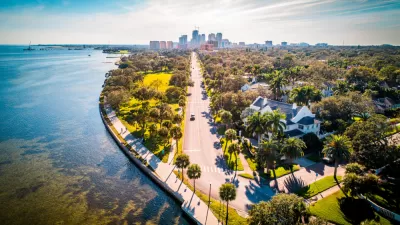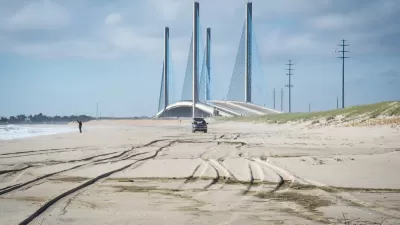Artificial reefs could offer a ‘softer’ flood management and erosion solution that doesn’t disrupt the flow of sediment.

Two pilot projects in Illinois are testing the potential of artificial reefs to reduce flooding risks in the Great Lakes, reports Lily Carey for Inside Climate News. The concept seeks to offer an alternative to concrete breakwaters and other flood mitigation tools that can exacerbate flood risk by compounding the effects of erosion.
Scientists managing the pilot projects plan to study how the reefs impact local shorelines and whether they could be a scalable solution for large lakes. According to researcher Hillary Glandon, “This project was hoping to come up with some softer designs, not necessarily fully stopping that movement of sand and water, but also a more cost effective design.”
As Carey explains, “Lake Michigan is already home to a handful of artificial reefs, most of which are located farther from shore as a habitat for marine life. Some researchers in the U.S., though, say these could serve the dual purpose of boosting fish populations and preventing erosion, disrupting waves so that they’re less intense when they crash ashore.”
Because the shores of Lake Michigan are lined with hundreds of private lots, shoreline management has often been a complicated project. “That makes artificial reefs particularly alluring in the Great Lakes—they’re a way to block wave energy without making erosion worse for neighbors, and they’re far cheaper than traditional infrastructure.” However, a lack of familiarity with nature-based interventions and a historical reliance on seawalls and breakwaters keep many residents wary of artificial reefs.
FULL STORY: Artificial Reefs Can Mitigate Coastal Erosion in the Great Lakes. Will Cities Agree to Adopt Them?

Maui's Vacation Rental Debate Turns Ugly
Verbal attacks, misinformation campaigns and fistfights plague a high-stakes debate to convert thousands of vacation rentals into long-term housing.

Planetizen Federal Action Tracker
A weekly monitor of how Trump’s orders and actions are impacting planners and planning in America.

In Urban Planning, AI Prompting Could be the New Design Thinking
Creativity has long been key to great urban design. What if we see AI as our new creative partner?

Massachusetts Budget Helps Close MBTA Budget Gap
The budget signed by Gov. Maura Healey includes $470 million in MBTA funding for the next fiscal year.

Milwaukee Launches Vision Zero Plan
Seven years after the city signed its Complete Streets Policy, the city is doubling down on its efforts to eliminate traffic deaths.

Portland Raises Parking Fees to Pay for Street Maintenance
The city is struggling to bridge a massive budget gap at the Bureau of Transportation, which largely depleted its reserves during the Civd-19 pandemic.
Urban Design for Planners 1: Software Tools
This six-course series explores essential urban design concepts using open source software and equips planners with the tools they need to participate fully in the urban design process.
Planning for Universal Design
Learn the tools for implementing Universal Design in planning regulations.
Gallatin County Department of Planning & Community Development
Heyer Gruel & Associates PA
JM Goldson LLC
City of Camden Redevelopment Agency
City of Astoria
Transportation Research & Education Center (TREC) at Portland State University
Jefferson Parish Government
Camden Redevelopment Agency
City of Claremont





























